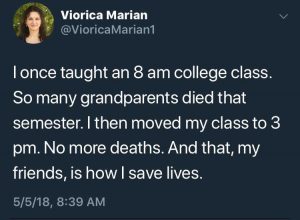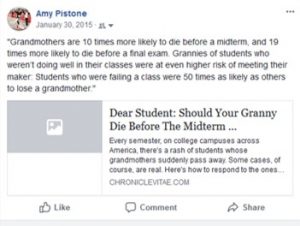It’s the end of the term [ed. note — it was when I drafted this!], which means that it’s time for the inevitable jokes about how frequently grandparents die right around deadline time. Loooooooool, amiright?

Does this happen? Absolutely. Does that mean that it’s ethical to make fun of your students in public spaces? Hard no on that one.
Academic Twitter has already done a wonderful job of making this argument (I made my very first Twitter Moment to pull some of my faves together), and I should give full credit to Jesse Stommel who re-started this conversation.
Wanted to pull together many of the good responses to @Jessifer‘s tweet about the perennial “LOL MY STUDENTS MAKE UP EXCUSES” trend (planning to write smthing about this soon) — made my first “moment”!
⚡️ “Stop Picking on Your Students for Some Likes”https://t.co/0H6KZBMDIm— Amy Pistone (@apistone) May 7, 2018
I don’t have anything to say that others haven’t already said (and in all likelihood, said better), but I wanted to pull things all together in one place.
I’ve been there, dealing with shenanigans from students, and I know that it can be really cathartic to vent a bit. Especially if you happen to be young, non-male, non-white, or marginalized in any other way — you’re more likely to have students challenging your authority in the classroom, and you may not have that many ways of dealing with your frustration aside from venting to your peers or colleagues. There aren’t great ways for people without some measure of job security to deal with students lying to them, and all (or at least most) of the available options carry a pretty high risk of a negative teaching evaluation. Venting can be important and cathartic. But please please please do your venting in private.
When students see teachers (obviously their teachers, but also any teachers) mocking students’ excuses, they might reasonably assume that deaths in the family aren’t an acceptable excuse. Especially if it occurs during the end of a term. Imagine for a second being the student who actually has a death in the family and doesn’t think they can talk to their instructor about it. The student who’s heard about being asked for an obituary and other proof of death and can’t handle getting that on top of getting their papers in.
Or imagine having any number of other hardships that you don’t think are good enough excuses, so you make up a sickness or a death because that seems like a “real” reason not to be able to come to class or turn a paper in. Maybe you can’t function because your depression has gotten bad. Maybe you’re working nights and that has to take precedence, so you can’t do a few assignments or you miss some early morning classes. Maybe you’re dealing with medical issues on your own for the first time in your life and you aren’t staying on top of things. So you are “sick” for the third time in four weeks. Maybe you were sexually assaulted and aren’t ready to put that in words but it’s making it hard to get schoolwork done. But you don’t have a doctor’s note because you aren’t ready to talk to a doctor. Or maybe the stress of college has given you an anxiety disorder but you think you just need to toughen up and deal with it.
The latest iteration of this focuses on how students spend their money. And we all know that some students are spending their money (or their parents’ money) on frivolous things instead of things we wish they had for class. Maybe you see some inconsistency surrounding the things your students do and don’t have in class. And maybe you want to share that with the world for some lols, because, hell, you’re stressed out and what’s the harm? Can I suggest that you resist the urge to share that particular snark? Or any snark about your students? Maybe 95% of your students don’t have to worry about money, and maybe a little internet sarcasm would get them to think about prioritizing their back-to-school purchases. Or maybe it won’t. Frankly, biting sarcasm doesn’t really change behavior as much as we might think it does. But the 5% of your students who are worried about how to pay for books or supplies or food (and for most institutions, it’s a fair bit higher than 5%), they see that someone who should be an ally is mocking them and people like them. And those students (all students) need a compassionate instructor who has their emotional well-being in mind.
So blow off some steam in a group text or over a few drinks. But think about the public face of teaching you put out there, and think whether it’s really worth it for a few likes.
Additional Reading
Vulnerability, Contingency, and Advocacy in Higher Education
Basic Needs Security and the Syllabus
Important Disclaimer
I don’t want for a moment to seem all holier-than-thou, because I was on this fun bandwagon a few years ago (and though I cringe to think back on this, I’m leaving it on my Facebook because it’s who I was then, and I don’t want to rewrite my own history and learning process) .


no replies